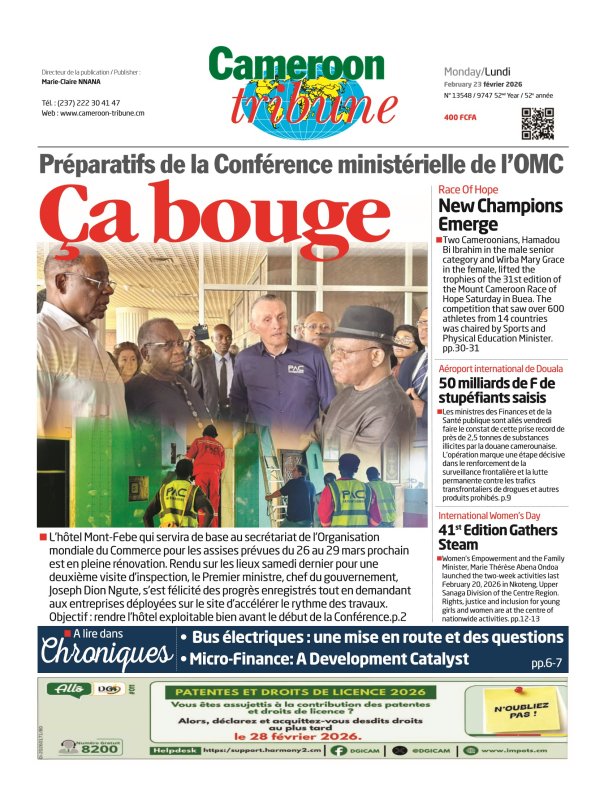Society appears today so slackened that even the health of human beings is left for careless business. The noble medical practices of consultation, test, prescription and sale of medicines are shifting from hospitals to the streets these days. That waywardness can aptly be described as counterfeit and street medicine.
As the phenomenon exponentially engulfs countries south of the Sahara and even unsuspected settings in the developed world, governments have a duty to shine a light especially as lives are under threat. It is an utmost crime for gangs formed across the world to continue to decimate people with supposed medicines.
In the face of the danger, the Cameroon government has deployed a fierce arsenal against fake and street medication engaging sensitsation campaigns, field control drives, destruction of counterfeit medicines and punishment of culprits. It has even gone further to extend the crusade to the army who recently joined in marking the International Day of fake medicines last 12 October. The Cameroon Navy was seen in Limbe in the South West Region staging a street walk in sports attire to send awareness signals against toxic medication. Such outings by informed sectors of society are meant to warn perpetrators, alert dupes, and curb the scourge of dangerous street medication.
Counterfeit and street medicines have emerged as a significant global issue with the devastating consequence it poses to public health and safety. These illicit products infiltrate the market, mislead even unsuspected consumers and damage legitimate pharmaceutical systems.
Experts in health describe counterfeit and street medicines as “illegal pharmaceutical products that are either deliberately mislabeled or produced without adhering to quality standards”. These products range from fake copies of branded medicines to deficient concoctions and formulations. These dangerous copies and falsifications lack the necessary active ingredients and contain harmful substances. The scope is alarming, upsetting both developed and developing nations.
The proliferation of counterfeit and street medicines poses severe health risks and undermines tedious useful research in the domain of health. Consumers are ignorantly exposed to these malignant products and suffer from damaging effects such as treatment failures and death. Its dubious quality, storage, and distribution further compounds risks, compromise patient safety and waters down trust in hospitals and pharmacies. Medication cannot be left to free practice, never to street application in the hands of money-hungry rascals. Many diseases are surfacing these days due to doubtful substances ingested through the engineering of crooks and rogues who fool patients for quick money.
Reliable sources report a government-cum Interpol crackdown on fake medicines impounding some 160 tons of counterfeit medicine last April. The catch was estimated over FCFA one and half billion in Cameroon’s political capital Yaounde, its economic seat Douala and the nation’s business pivot of Bafoussam. The operation was dubbed “cobra” and involved mixed squads of Police, Customs, Pharmacists and Medical authorities who combed markets, warehouses and suspicious areas. Some of the fake medicine was reported as locally fabricated while others infiltrated from abroad. Granting that only one raid could produce that much, it becomes convincing that continued effort can yield more fruits and dry up the sources of evil medical trade.
Factors contributing to the growth of counterfeit and street medicines include economic motivations, regulatory vacuums, corruption and inadequate supply of genuine medicines. Poverty, too, demands that low-cost generic medications be sufficiently vulgarised among needy populations. Technological advancement, like online marketplaces, has correspondingly facilitated the circulation of illicit products. Such channels render it challenging to monitor and trace the origins of fake medicines. A strong front to shoot down bad medication has remained laughable in many areas.
Robust solutions are required to build a formidable front to combat counterfeit and street medicines. Most Sub-Saharan communities lack the necessary medical legislation leaving consumers of fake medicines at the mercy of trickster-traffickers and exposing patients to the caprices of delinquent practitioners. Governments must criminalise and punish severely the productio...
Cet article complet est réservé aux abonnés
Déjà abonné ? Identifiez-vous >
Accédez en illimité à Cameroon Tribune Digital à partir de 26250 FCFA
Je M'abonne1 minute suffit pour vous abonner à Cameroon Tribune Digital !
- Votre numéro spécial cameroon-tribune en version numérique
- Des encarts
- Des appels d'offres exclusives
- D'avant-première (accès 24h avant la publication)
- Des éditions consultables sur tous supports (smartphone, tablettes, PC)











Commentaires